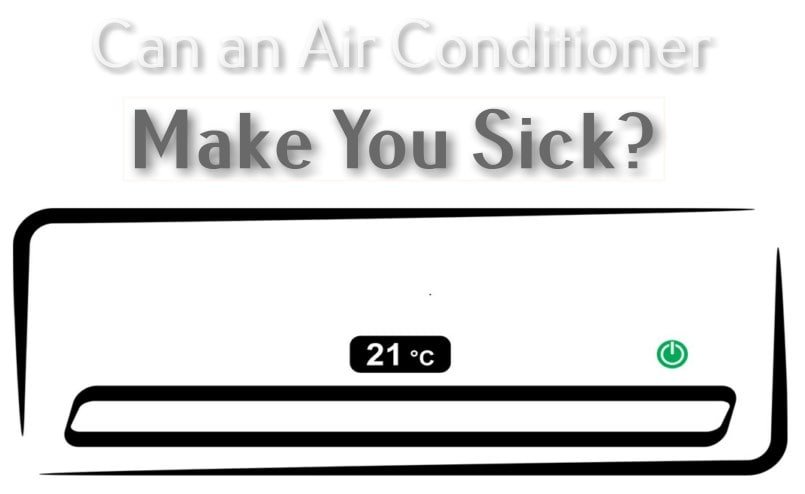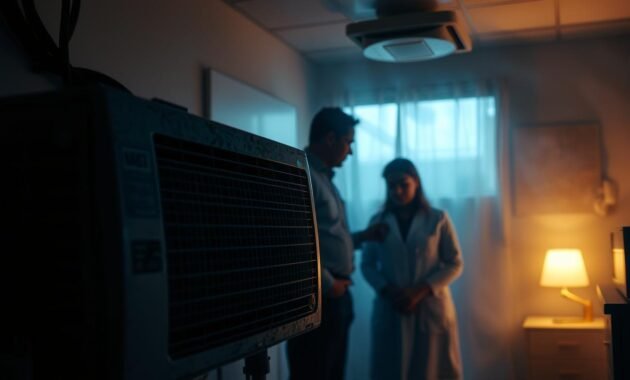Ever thought your air conditioner might be making you sick? Many people are concerned about health risks from air conditioning. The AC itself doesn’t cause illness, but it can spread dust, bacteria, and allergens around your home.
The truth is a bit complicated. Air conditioning might lead to breathing problems, allergies, and other health issues if not kept clean. I’ll explain how ACs can affect your health and share tips to stay healthy while staying cool.
Ready to learn how your air conditioner affects your health? This journey will help you breathe better and stay healthy, no matter the weather.

Understanding the Link Between Air Conditioning and Health
Air conditioning systems are key to our daily comfort. Yet, they can hide health risks. Studying indoor air quality, I found the link between air conditioners and health is complex.
Air conditioner health risks are often overlooked. Buildings with advanced air conditioning can harbor health dangers. The time we spend in air conditioning affects how our bodies react to indoor conditions.
How Air Conditioners Affect Indoor Air Quality
Indoor air quality can worsen if air conditioning systems aren’t kept up. Sick building syndrome is a major concern. It’s linked to health issues caused by indoor conditions.
- Contaminant circulation through HVAC systems
- Potential microbial growth in air ducts
- Reduced air exchange with external environments
The Science Behind Temperature Regulation
Our bodies aim to keep the perfect temperature. Air conditioning disrupts this by creating artificial environments. This can stress our bodies and trigger responses.
Impact on Human Body Systems
Long-term air-conditioned environments can harm our bodies. They can alter our respiratory, cardiovascular, and immune systems. This is due to constant artificial temperature control.
- Respiratory system sensitivity
- Potential immune system modifications
- Skin hydration challenges
Knowing these connections helps us make better choices for our health and indoor environments.
Can Air Conditioner Make You Sick: Separating Facts from Fiction

Many people wonder if air conditioners can make you sick. The answer is not a simple yes or no. Air conditioning systems can lead to respiratory problems if not maintained well.
Air conditioning allergens are a big concern for health. Dirty or neglected AC units can harbor harmful germs. These systems spread air that might have:
- Dust particles
- Mold spores
- Bacteria
- Pollen
Not cleaning your air conditioner regularly can make you sick. It spreads harmful particles everywhere. Also, air conditioning’s dry air can cause:
- Dry skin
- Irritated respiratory passages
- Increased susceptibility to infections
To avoid health risks, keep your air conditioner clean. Use good air filters, clean ducts often, and ensure good ventilation. This will help maintain the quality of your indoor air.
Common Health Issues Related to Air Conditioning Systems
Air conditioning can sometimes trigger unexpected health challenges that many people aren’t aware of. Understanding the respiratory problems from AC and other related symptoms can help you maintain better indoor comfort and wellness.
Air conditioner illness symptoms can manifest in various ways, affecting different body systems. While air conditioning provides comfort, it may also create environmental conditions that impact your health.
Respiratory Problems and Allergic Reactions
Prolonged exposure to air-conditioned environments can lead to respiratory issues. Individuals might experience:
- Persistent coughing
- Nasal congestion
- Increased allergic responses
- Difficulty breathing
Dehydration and Skin Issues
Cold air can cause significant moisture loss. To combat these effects, make sure to drink plenty of water throughout the day. Skin may become dry and irritated due to constant air conditioning exposure.
Eye Irritation and Headaches
Some people experience eye discomfort and frequent headaches when spending extended periods in air-conditioned spaces. These symptoms can result from:
- Low humidity levels
- Direct cold air exposure
- Poor air circulation
- Dust and allergen accumulation
By understanding these health risks, you can take proactive steps to minimize negative impacts while enjoying the benefits of air conditioning.
The Truth About Sick Building Syndrome

Sick building syndrome is a health problem many face without knowing why. I’ve studied indoor air quality a lot. I can tell you how your air conditioning unit might be part of the issue.
This syndrome causes many health problems linked to being in certain buildings. People often get:
- Persistent headaches
- Respiratory difficulties
- Skin irritation
- Fatigue and concentration problems
Your air conditioning unit is key in this situation. If it’s not kept up, it can harbor harmful germs. Without enough fresh air, pollutants build up, leading to sick building syndrome symptoms.
Several environmental factors contribute to sick building syndrome:
- Poor ventilation systems
- High humidity levels
- Chemical contaminants from office equipment
- Inadequate temperature control
To stop sick building syndrome, we need to act early. Keeping your air conditioning in check, ensuring good air flow, and checking the air quality can help a lot. This way, we can lower the health risks from bad indoor air.
How Dirty Air Conditioners Become Breeding Grounds for Bacteria
Your air conditioner might look clean, but it could be hiding harmful microorganisms. HVAC system bacteria thrive in dark, moist places. This turns your cooling system into a health risk.
Air conditioning systems are perfect for bacteria to grow. Dust, moisture, and warmth create an ideal spot for microbes. These can spread through your home’s air.
Mold and Bacterial Colonization in AC Units
When your air conditioner isn’t cleaned, dangerous microbes multiply. These tiny invaders include:
- Legionella bacteria
- Mold spores
- Staphylococcus
- Fungal colonies
Warning Signs of Bacterial Contamination
It’s important to know when your AC needs attention. This keeps your indoor air quality healthy. Watch for these signs:
- Musty smells when it runs
- Visible mold around vents
- Increased allergy symptoms
- Reduced airflow
Maintenance Strategies to Prevent Bacterial Growth
| Maintenance Task | Frequency | Purpose |
|---|---|---|
| Replace Air Filters | Every 90 days | Remove dust and possible bacterial carriers |
| Professional Cleaning | Annually | Deep clean HVAC system parts |
| Drain Pan Inspection | Every 6 months | Stop moisture buildup |
By being proactive with air conditioning maintenance, you can lower bacterial risk. This protects your family’s health.
Car Air Conditioning: Special Considerations
Car air conditioning systems can pose unique health challenges that many drivers overlook. As someone who has studied automotive comfort and health, I’ve discovered several critical insights about how these air conditioning systems might impact your well-being during travel.
The confined space and limited air circulation in vehicles increase health risks from air conditioning systems. Bacteria and mold can quickly develop in car AC systems, making them damp and cool.
- Bacterial growth thrives in moist AC vents
- Stagnant air increases contamination risks
- Improper maintenance accelerates microorganism spread
Preventing health issues related to car air conditioning requires strategic approaches. Regular maintenance and understanding how to use your vehicle’s AC effectively are key steps in protecting yourself from sickness.
| AC Usage Scenario | Potential Health Risk | Recommended Action |
|---|---|---|
| Infrequent System Cleaning | Respiratory Irritation | Clean AC system every 6 months |
| Extended Cool Mode | Bacterial Proliferation | Regularly change cabin air filter |
| High Humidity Conditions | Mold Development | Use AC with proper ventilation |
By understanding how air conditioning systems can potentially make you sick and implementing preventive strategies, you can enjoy comfortable and healthy driving experiences.
Prevention Tips for Healthy Air Conditioning Use
Using an air conditioning unit healthily needs careful attention and proactive steps. Proper use of your cooling system greatly affects your well-being and indoor air quality.
Optimal Temperature Settings
Choosing the right temperature is key for comfort and health. I suggest keeping your air conditioning between 72-78 degrees Fahrenheit. This range helps avoid extreme temperature changes that can stress your body.
- Avoid setting temperatures too low
- Use programmable thermostats for consistent comfort
- Create gradual temperature transitions
Maintenance Schedule Guidelines
Regular maintenance keeps your air conditioning unit running well and providing fresh air. Set up a routine for cleaning and inspections to avoid health risks.
| Maintenance Task | Frequency |
|---|---|
| Replace Air Filters | Every 1-3 months |
| Professional HVAC Inspection | Annually |
| Clean Air Vents | Every 6 months |
Air Quality Enhancement Methods
To better indoor air quality, consider using air purifiers and ensuring good ventilation. Also, drink plenty of water to stay hydrated, mainly when using air conditioning for long periods.
- Use HEPA air purifiers
- Open windows periodically for fresh air circulation
- Consider indoor plants that naturally filter air
By following these tips, you can enjoy your air conditioning unit’s benefits while reducing health risks and keeping a comfortable home.
Read also: Can Air Conditioning Give You A Cold?
Warning Signs Your AC is Affecting Your Health
Air conditioners can pose health risks through various symptoms. These signs are often overlooked. Spotting them early can safeguard your health and avoid serious issues.
Your body gives clear signals when an air conditioner is harming you. Look out for these warning signs:
- Persistent headaches that worsen indoors
- Unexplained respiratory difficulties
- Chronic fatigue or sudden drowsiness
- Unusual dizziness or lightheadedness
- Frequent nosebleeds
- Irritation in eyes, nose, and throat
These symptoms could mean there’s a problem with your air conditioner. Issues like dirty filters or bacterial growth can be culprits. If you feel consistently uncomfortable indoors, it’s time to check your AC.
Getting a professional HVAC inspection is a good first step. It can uncover if your AC is causing these problems. Regular upkeep, cleaning, and good ventilation are key to avoiding health risks.
If you’re experiencing many symptoms, see a doctor. They can check for serious health issues and make sure your AC isn’t harming you.
Conclusion
Exploring air conditioning systems and health, I found that knowing how they work is key. Can air conditioners make you sick? Not usually. When kept in good shape, they can even make the air inside better and help your health.
It’s important to use air conditioning wisely. Regular checks, clean filters, and watching humidity levels can help avoid health problems. Spending time in air conditioning doesn’t always mean you’ll get sick. Being smart and aware can protect you from breathing issues.
Air conditioning systems are great, even for those with allergies or breathing problems. The trick is to take care of them. Clean filters, the right temperature, and professional checks can make your air conditioning safe and comfortable.
Knowing about your air conditioning system helps you make healthier choices. By using it wisely, you can have cool, clean air without risking your health. Stay informed, stay cool, and breathe easily.


